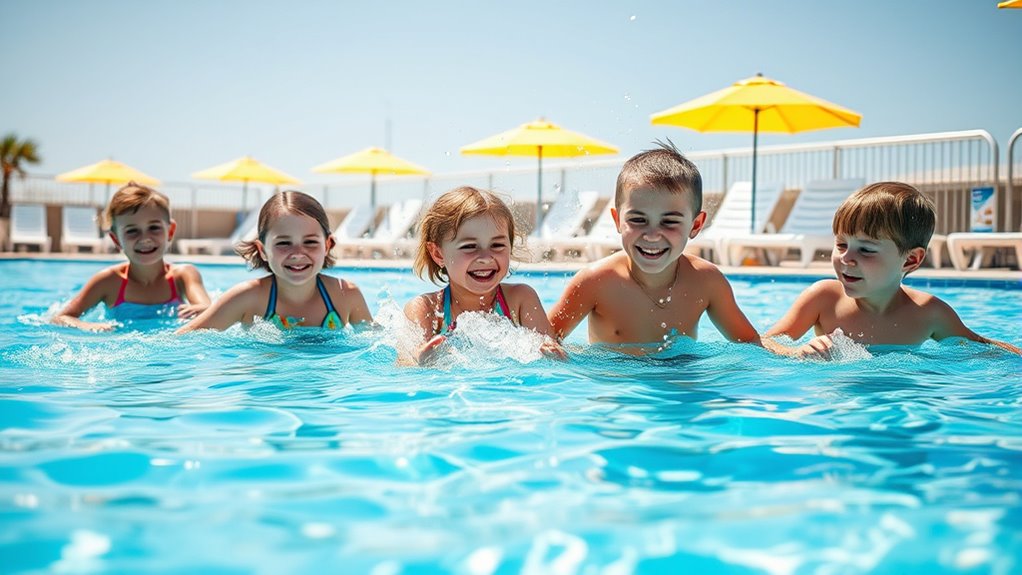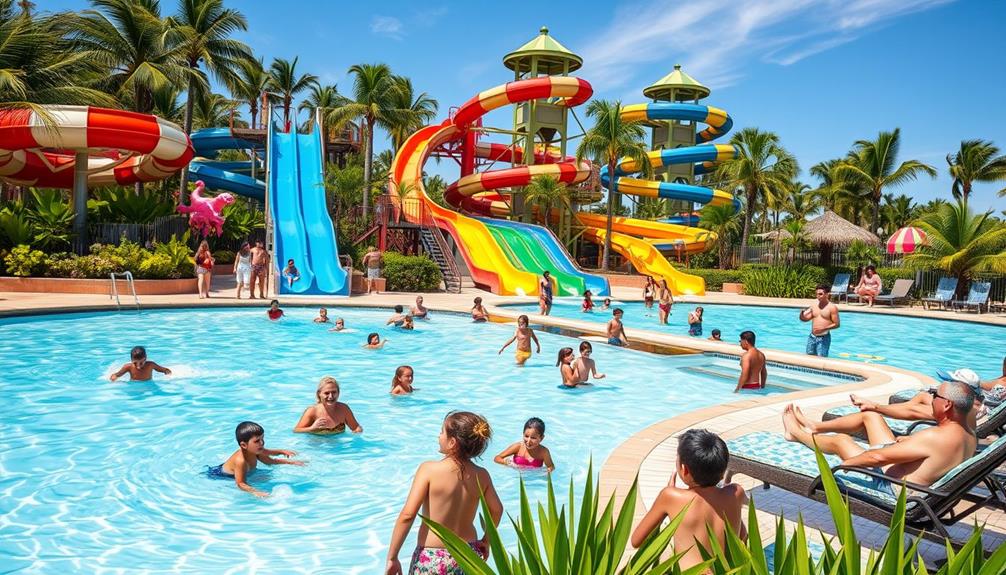To keep splashing fun and germ-free, shower before entering the pool to remove dirt and bacteria. Keep your personal items clean and avoid sharing them. Don’t swim if you’re feeling sick, and practice good hygiene like washing hands often. Wear properly fitting, chlorine-resistant swimwear and follow pool rules to maintain safety and cleanliness. If you want to know more tips for germ-free swimming, more helpful details await below.
Key Takeaways
- Follow proper showering routines before swimming to reduce germs and contaminants in the pool water.
- Avoid splashing or disruptive behavior to minimize the spread of bacteria and maintain a hygienic environment.
- Keep personal belongings clean, separate, and stored in designated waterproof containers to prevent cross-contamination.
- Refrain from swimming when feeling unwell or experiencing symptoms like diarrhea or cough.
- Respect pool rules, maintain low noise levels, and practice good respiratory hygiene to ensure a germ-free experience for all.
Shower Before You Swim

Showering before you swim helps remove dirt, sweat, and oils from your skin, reducing the chance of contaminating the pool. Good personal hygiene is essential to maintain water quality and keep the pool safe for everyone. When you rinse off, you wash away bacteria, lotions, and other substances that could pollute the water. This simple step makes a significant difference in preventing the spread of germs and ensuring the water stays clean longer. Use warm water and soap, focusing on areas prone to sweat and oils, like underarms and hair. Taking a quick shower before swimming not only protects others but also helps you enjoy a fresher, more hygienic experience. Proper pre-swim hygiene can also reduce the need for frequent filter replacements, helping maintain the pool’s filtration system more effectively. Maintaining personal hygiene is crucial for public health by reducing potential disease transmission. When everyone practices good hygiene, it creates a safer environment for all swimmers. Additionally, hygiene practices contribute to the longevity of the pool equipment and overall water quality. Remember, clean bodies contribute to healthier pools for all swimmers.
Keep Personal Items Clean and Separate
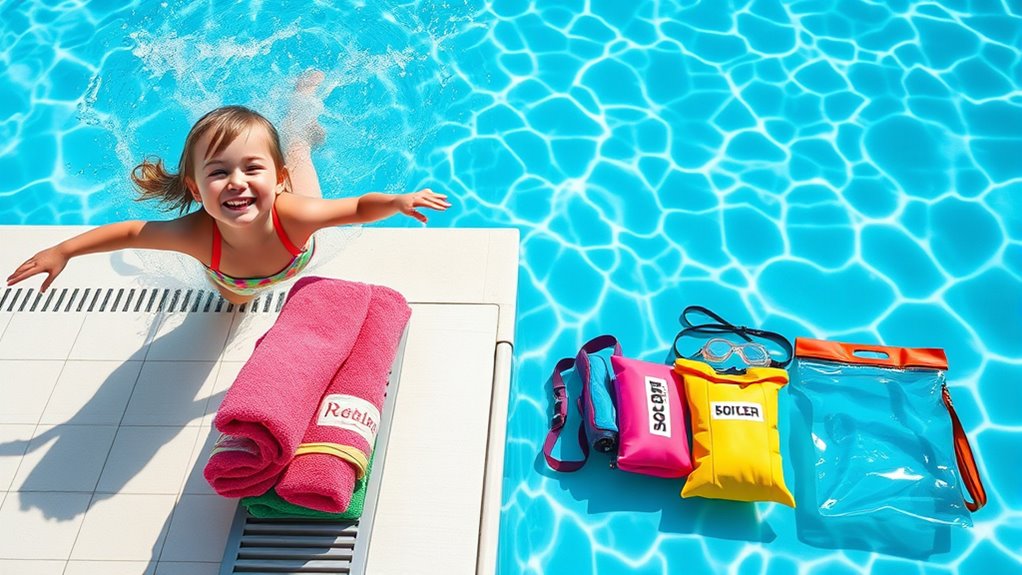
To prevent the spread of germs and maintain pool hygiene, it’s important to keep your personal items clean and separate from others’. Use designated personal storage, like a waterproof bag or container, to keep your belongings organized and protected from contamination. Label your items clearly with your name or initials to avoid mix-ups with others’ belongings. This simple step ensures that your towels, goggles, and personal care products stay sanitary and are easily identifiable. Avoid sharing or borrowing items to reduce the risk of cross-contamination. After swimming, wash your personal items regularly and store them in a clean, separate space. Keeping your belongings organized and properly labeled helps maintain hygiene and keeps your pool experience safe and enjoyable. Proper storage methods help prevent cross-contamination and support good hygiene practices. Additionally, consider using hygiene-focused storage solutions that are easy to clean and disinfect regularly. Incorporating digital literacy programs can also encourage responsible sharing and proper hygiene awareness among pool visitors.
Avoid Swimming When Unwell
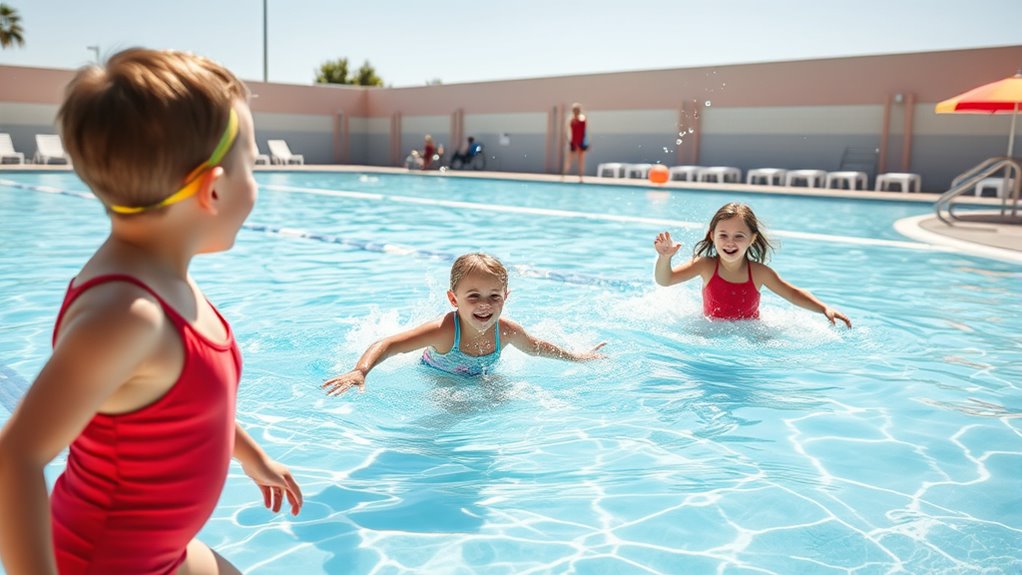
If you’re feeling sick, it’s best to skip swimming to protect others from germs and prevent contaminating the pool. Swimming while unwell can increase health risks for everyone, especially those with weaker immune systems. By waiting until you’re well, you help keep the pool safe and enjoyable for all. Additionally, practicing good hygiene and understanding community health can help maintain a clean and safe environment around public pools. Recognizing the importance of spiritual guidance and its influence on well-being can also promote a more considerate and sanitary atmosphere for everyone enjoying the facilities.
Protect Others From Germs
When you’re feeling sick, swimming can quickly spread germs to others in the pool. To protect others, avoid entering the water until you’re fully recovered. Use hand sanitizer frequently before and after swimming, especially if you touch shared surfaces. Rely on pool disinfectants maintained by the facility to reduce germs, but remember they can’t eliminate all risks if you’re contagious. Additionally, practicing good hygiene with essential oils for respiratory health may support your recovery and reduce the risk of transmitting infections. Here are four ways to help protect others: 1. Stay home if you’re unwell. 2. Wash your hands regularly with soap or hand sanitizer. 3. Avoid swallowing pool water or putting your face near the water’s surface. 4. Cover your mouth when coughing or sneezing to prevent germs from spreading. Maintaining proper hygiene practices and understanding indoor air quality can further minimize health risks in shared environments. Recognizing the role of attention in creative practice can help individuals stay mindful of their health and hygiene. Regular disinfection protocols are also vital in reducing the presence of germs in pool areas.
Prevent Pool Contamination
Swimming while you’re unwell can quickly contaminate the pool and pose a health risk to others. To prevent this, avoid swimming if you have symptoms like diarrhea, cough, or fever. Maintaining proper chemical balance is essential; imbalanced chlorine levels won’t effectively kill germs. Regularly check and adjust the pH and sanitizer levels to keep the water safe. Additionally, ensure filter maintenance is up to date. Clean and replace filters as recommended to remove contaminants efficiently. Dirty filters can harbor bacteria and viruses, increasing the risk of spreading illness. Proper storage and handling of pool chemicals can help maintain water quality and prevent chemical imbalances. Implementing proper pool maintenance practices is crucial for water safety and sanitation. Using a quality air purifier can also help reduce airborne bacteria and odors around the pool area, contributing to a healthier environment. By staying home when unwell, keeping the water properly balanced, and maintaining your pool’s filtration system, you help protect everyone’s health and keep the pool clean and safe for all swimmers.
Minimize Health Risks
Contaminating the pool with germs from an unwell body can spread illnesses to others and undermine water safety. To protect everyone, avoid swimming when you’re sick. Proper pool maintenance and chlorine effectiveness rely on healthy swimmers to prevent contamination. Using an air purifier in the surrounding environment can also help reduce airborne germs and allergens, contributing to overall health safety. Consider these precautions:
- Don’t swim if you have diarrhea, colds, or infections.
- Shower thoroughly before entering the pool.
- Keep cuts or open wounds covered.
- Follow pool rules for hygiene and health.
Additionally, understanding sprayer technology can help in maintaining a safer environment by ensuring proper disinfection methods are used during cleaning and maintenance. Maintaining a clean and healthy pool environment is also supported by proper sanitation protocols, which include regular testing and adjusting of water chemistry to keep germs at bay. Regular water testing ensures that disinfectants like chlorine are at effective levels, preventing the growth and spread of harmful germs. Proper pool hours can also help manage maintenance schedules to ensure water quality is consistently monitored and maintained.
Practice Proper Pool Hygiene
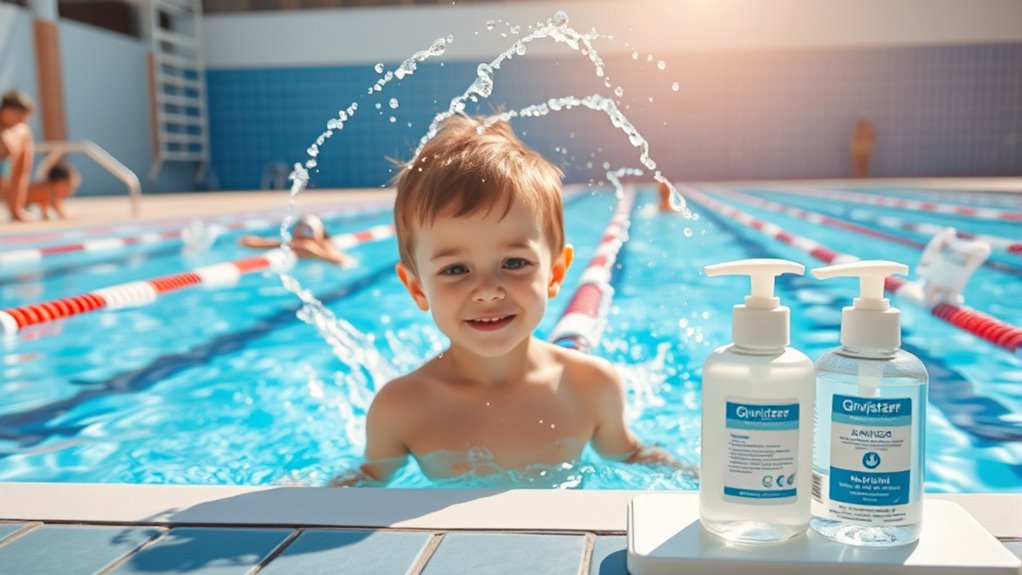
Practicing proper pool hygiene is essential to keep the water safe and enjoyable for everyone. You should always shower before entering, removing dirt and oils that can affect water quality. Maintain pool chemical safety by following posted guidelines and avoiding actions that throw off balance, like adding personal chemicals. Respect underwater etiquette by avoiding splashing or disruptive behavior that can endanger others. Remember, your actions impact the entire community’s experience. To help visualize, consider this:
| Responsible Behavior | Respectful Interaction | Safe Swimming Practices |
|---|---|---|
| Shower before swimming | Avoid loud splashing | Follow pool rules |
| Don’t urinate in the water | Share space politely | Use designated lanes |
| Keep personal items out of water | Be mindful of others | Limit time if unwell |
| Report issues immediately | Maintain calm demeanor | Practice good hygiene |
Be Mindful of Your Behavior in the Water

While enjoying the water, it’s important to stay mindful of your behavior to guarantee everyone’s safety and comfort. Your actions can impact others’ experience and pool hygiene. Follow proper diving etiquette by avoiding reckless dives that could cause injuries or disturb swimmers nearby. Keep noise levels reasonable so everyone can relax or converse comfortably. Be aware of your splashing, as excessive splashing can spread germs and make the water less pleasant. Also, avoid diving into shallow areas or crowded spots to prevent accidents. Respect others’ space and avoid unnecessary roughness. Remember, courteous behavior promotes a safe, hygienic environment for all.
- Follow proper diving etiquette at all times
- Keep noise levels low and considerate
- Minimize splashing in shared spaces
- Respect others’ personal space
Use Appropriate Swimwear
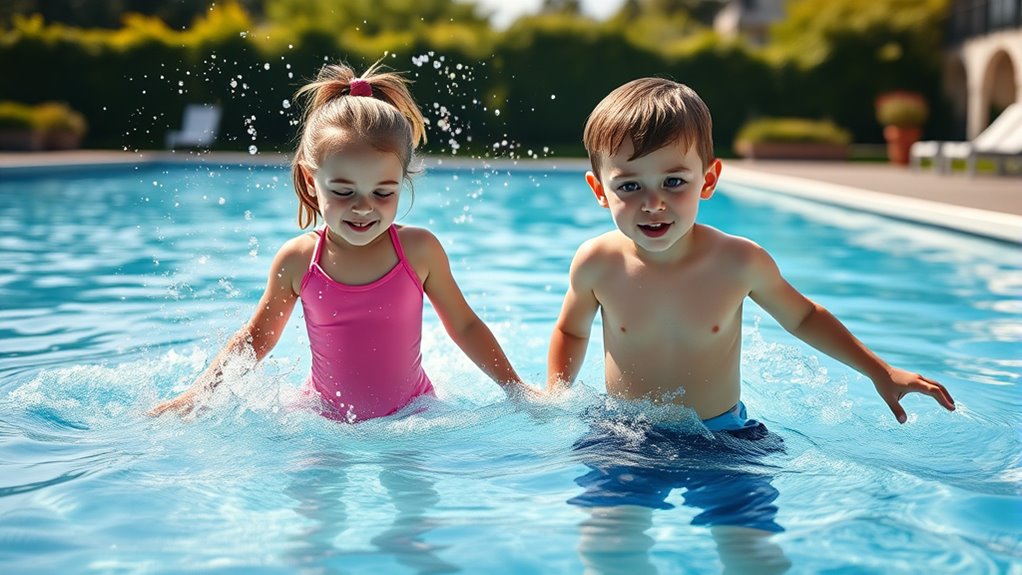
Wearing appropriate swimwear is essential for maintaining pool hygiene and ensuring everyone’s comfort. Choose swimwear made from quick-drying, chlorine-resistant fabrics to prevent bacteria buildup. Ensure your swimwear fit is snug but not tight, avoiding excess fabric that can trap dirt and germs. Proper fit also reduces the risk of wardrobe malfunctions and unnecessary contact with pool surfaces. To help you select the right gear, here’s a quick guide:
| Swimwear Fabric | Fit | Suitable for |
|---|---|---|
| Polyester, Spandex | Snug but comfortable | Regular swimming |
| Nylon blends | Tight, supportive | Competitive sports |
| Chlorine-resistant | Flexible, secure | Pool use frequently |
| Quick-drying | Not too loose | Recreational swimming |
| Eco-friendly fabrics | Properly fitted | Eco-conscious swimmers |
Choosing the right swimwear helps keep the pool cleaner and your experience enjoyable.
Follow Pool Rules and Guidelines
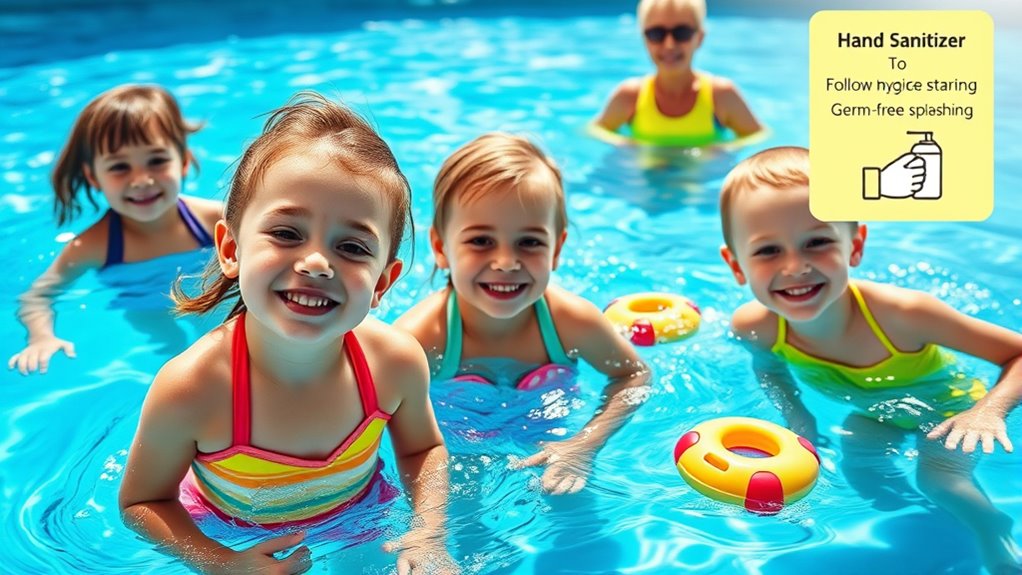
Always read the signage carefully before entering the pool area to understand the rules. Follow the instructions given by pool staff to guarantee everyone’s safety and comfort. Respecting these guidelines helps keep the pool a clean and enjoyable environment for all.
Read Signage Carefully
Reading the signage at a public pool is essential to staying safe and enjoying your time. Signage instructions clearly communicate important safety measures and pool rules you must follow. Ignoring these signs can lead to accidents or health issues. Always pay attention to posted guidelines before entering the water.
Here are four key points to remember:
- Follow posted pool rules, including showering before swimming.
- Respect signage instructions regarding no diving or running.
- Observe rules about hygiene, such as not swimming when sick.
- Adhere to age or height restrictions when necessary.
Respect Pool Staff Directions
Following the instructions of pool staff is essential for ensuring everyone’s safety and enjoying your time at the pool. Adhering to pool etiquette and staff communication helps maintain a safe, clean environment. Listen carefully to posted signs and staff instructions, whether it’s about diving areas, no running zones, or shower requirements. Visualize the pool as a grid:
| Swim Zone | Safety Rules | Quiet Area |
|---|---|---|
| Shallow End | No diving | Lounge Area |
| Deep End | No glass | Rest Stations |
Respecting staff directions keeps the pool environment organized and safe. Ignoring these guidelines can lead to accidents or contamination. When you follow staff communication and pool etiquette, you contribute to a positive experience for everyone, making sure the pool stays fun and germ-free.
Frequently Asked Questions
What Are the Long-Term Health Risks of Poor Pool Hygiene?
Poor pool hygiene can lead to long-term health risks like recurring infections and respiratory issues. When you don’t maintain proper chlorination, bacteria and viruses develop chlorine resistance, making them harder to eliminate. Microbial resilience means harmful germs can persist, increasing your risk of illnesses over time. To protect your health, guarantee proper disinfection and hygiene practices, so these resilient microbes don’t cause ongoing health problems.
How Often Should Pool Water Be Tested for Contaminants?
Imagine your pool as a garden needing regular care. You should test your pool water frequently, ideally at least 2-3 times a week, to catch contaminant detection early. Water testing helps you spot harmful bacteria, chemicals, or debris before they grow. By staying vigilant, you protect everyone’s health, ensuring your pool remains a safe oasis. Consistent testing keeps the water clear, healthy, and inviting for all swimmers.
Are There Specific Hygiene Products Recommended for Swimmers?
When it comes to hygiene products, you should choose swimmer’s soap to thoroughly cleanse your skin before entering the pool, removing oils and dirt. Additionally, applying protective lotions can help prevent skin irritation caused by chlorinated water. These products support your hygiene routine and protect your skin, making your swimming experience safer and more comfortable. Always opt for gentle, water-compatible products to maintain cleanliness without contaminating the pool.
How Can Pool Staff Improve Hygiene Enforcement?
You can improve hygiene enforcement by ensuring your team is well-trained and consistently follows protocols. Use clear pool signage to remind swimmers about hygiene rules, like showering before swimming and avoiding contamination. Regular staff training reinforces these practices, encouraging staff to monitor and address any violations promptly. Combining effective signage with ongoing training helps create a culture of hygiene, making your pool safer and more enjoyable for everyone.
What Are the Latest Innovations in Pool Sanitation Technology?
You’ll want to stay updated on the latest innovations in pool sanitation technology. UV sanitation uses ultraviolet light to kill bacteria and viruses efficiently, reducing chemical reliance. Electrochlorination systems generate chlorine on-site, offering continuous, safe disinfection. These advancements help maintain a cleaner, safer pool environment, making your experience more enjoyable. Embracing these technologies guarantees better hygiene standards, minimizes chemical use, and keeps public pools healthier for everyone.
Conclusion
By following these simple hygiene tips, you not only protect yourself but also help keep the pool safe for everyone. It’s funny how a quick shower or avoiding swimming when sick can prevent so many germs from spreading. Sometimes, a small habit can make a big difference—just like that one time a simple tip kept you from getting sick after a pool day. So, stay mindful, and enjoy your swim with peace of mind!

